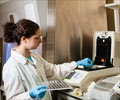Genetic testing identifies whether or not an individual has an increased risk for certain types of cancer. While you don't inherit cancer, you can inherit a higher risk for developing it
DALLAS, Family members of those who are successfully fighting cancer are protecting themselves and their families from the disease through genetic testing and hereditary cancer risk assessment. Genetic testing offers early detection and the opportunity to not only reduce the risk of cancer, but to save lives.
Genetic testing identifies whether or not an individual has an increased risk for certain types of cancer. While you don't inherit cancer, you can inherit a higher risk for developing it. Families celebrating National Cancer Survivors Day(R) this month agree that early detection is one of the best ways people can protect their health and raise the chances of successful outcomes.A growing number of cancer patients are choosing to be tested for genetic abnormalities that significantly increase the risk of getting the disease in a different form.
"With genetic testing, we are able to identify a unique subgroup of patients whose medical management will likely change due to a higher risk of developing cancer because of an inherited mutated gene. With a combination of increased surveillance and preventative strategies, we are able to decrease the risk of dying from either breast or ovarian cancer in a great number of these patients," said Dr. John Sandbach of Texas Oncology, the world's largest group of medical professionals focused solely on cancer care.
"More and more people are discovering this valuable tool and taking action." Approximately 10 percent of properly selected breast cancer patients carry either a BRCA 1 or BRCA 2 mutation. Of that group of patients, somewhere between 50-80 percent will develop breast cancer if appropriate preventative strategies are not implemented.
Increasingly, many of those family members who are finding that they have inherited a genetic abnormality are taking steps such as closer medical surveillance, drug/hormone therapy for prevention, or surgery to thwart the onset of cancer even though they show no signs of developing the disease. In essence, genetic testing is helping cancer survivors fight for their loved ones.
Dinora Niedzwiedz was tested after her mother developed breast and ovarian cancer. She, too, now has breast cancer. "Unlike my mother, I and our future generations, do have the genetic testing advantage and are able to use that information to better protect and preserve our health. While some individuals may view genetic testing as a scary thing, we view it as an opportunity to beat cancer before it strikes," Niedzwiedz said.
Advertisement
Genetic Testing
Advertisement
-- Multiple family members have the same type of cancer
-- Cancer is diagnosed at age 50 or younger
-- Cancer develops in paired organs (both breasts, both ovaries, both kidneys)
-- Multiple types of cancer occur in one individual
2. Learn how genetic testing works.
While genetic testing is a complex analysis of DNA, it is a simple procedure for the patient. An accurate genetic test can determine whether or not a person has a disease-related gene mutation that may increase the risk of certain cancers. Patients are asked to:
-- Complete a personal and family medical history along with a counseling session.
-- Provide a small blood sample for testing.
-- Following the testing, participate in a comprehensive education and discussion session. Based on the results of the test, those with a gene mutation -- and a higher risk of cancer -- discuss options for next steps.
3. Know the benefits and risks associated with genetic testing.
Being an educated patient can help you to make informed decisions that will impact you and your family. Some benefits and risks associated with genetic testing, include:
-- Benefits: Relief of uncertainty, understand cancer risk, make informed medical and lifestyle decisions, and provide helpful information to other family members.
-- Risks: Difficulty coping with known cancer risk, impact on family and personal relationships, and concern about the privacy of results.
4. Educate family members.
If you have a family history of cancer, tell your family members about genetic testing. People found to have a gene mutation have multiple options for disease prevention that could save their lives. Remember, the testing may find that they do not have a mutated gene, and can give peace of mind.
Source: PR Newswire
LIN/M











